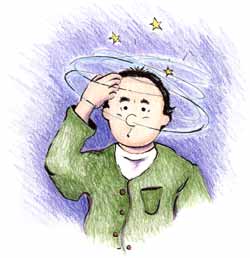
Why did I get Dizzy?
Diseases of the vestibular system can induce vertigo and dizziness, often accompanied by nausea. 80% of people over the age of 65 have experienced dizziness and benign paroxysmal positional vertigo (BPPV). BPPV is the cause of approximately 50% of dizziness in older persons. About half the time, doctors can’t find a specific cause for BPPV. Whiplash and head trauma is a frequent cause of vestibular disorders in people under the age of 50.
Vestibular rehabilitation therapy (VRT) can help people with a variety of vestibular problems, including benign paroxysmal positional vertigo (BPPV), Ménière’s disease, labyrinthitis, vestibular neuritis or even a result of trauma. Even individuals with long-term unresolved inner ear disorders who have undergone a period of medical management with little or no success may benefit. VRT can also help people with an acute or abrupt loss of vestibular function following motor vehicle accidents, sports injuries and surgery for vestibular problems.
What is Vestibular rehabilitation therapy?
The Vestibular system contributes to balance in humans and most mammals. The vestibular system sends signals primarily to the areas of the brain that control eye movements, and to the muscles that keep us upright.
Vestibular rehabilitation is a manual therapy and exercise based program, where a qualified physiotherapist will first perform a thorough evaluation that begins with a medical history and includes an assessment of posture, balance and gait, and compensatory strategies. Using the evaluation results, the therapist will develop a custom program for your particular problem. Depending on the diagnosis, the therapist may also perform some re-positioning procedures and teach you how to do them on your own at home to help treat and prevent future problems. In most BPPV cases only one or two in-clinic re-positioning procedures are enough cure the problem.
If you experience dizziness associated with benign paroxysmal positional vertigo (BPPV), consider these tips and remember SAFETY FIRST
- Be aware of the possibility of losing your balance, which can lead to falling and serious injury.
- Sit down immediately when you feel dizzy.
- Use good lighting if you get up at night.
- Walk with a cane for stability if you’re at risk of falling.
- Work closely with your doctor to manage your symptoms effectively.
- Have someone drive you to your appointments
BPPV may recur even after successful therapy. The condition can be managed safely and effectively with physical therapy and home treatments. If you suffer from BPPV or any other conditions that affect your balance or make you dizzy, contact our office to schedule your assessment today.


